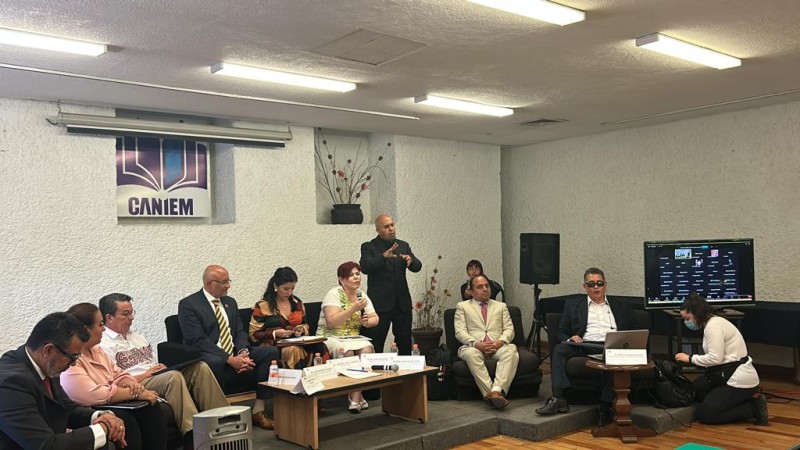On June 21st, the Mexican Association for Intellectual Property Protection (Asociación Mexicana para la Protección de la Propiedad Intelectual) celebrated the discussion forum “Marrakesh Treaty in Mexico. Its Application and Publishing Tools for Accessible Books” (Tratado de Marrakech en México. La aplicación del tratado y herramientas editoriales para ediciones accesibles). The event was hosted by the National Chamber for the Mexican Publishing Industry (Cámara Nacional de la Indistria Editorial Mexicana, CANIEM). It gathered a wide variety of professionals and institutions that talked from different points of view about the current state of the treaty´s provisions in Mexico.
The first panel was called “Overcoming Reading Barriers. The Marrakesh Treaty and its Application in the Publishing Industry” (Superando barreras para la lectura. El Tratado de Marrakech y su aplicación en la industria editorial) and was moderated by Miroslava Cisne, intellectual property and human rights lawyer. First, María Concepción Hernández shared the obstacles she faced during her years at school as a visually impaired person in getting access to accessible books. She also described how this experience got easier as technology offered new accessibility solutions.
Then, two editors from different poles of the Mexican market enriched the debate. Ana María Bermudez, PRH Mexico editor, addressed the reasons why publishers feel uncomfortable about the treaty´s provisions and invited her colleagues to make an effort in applying the approach of universal publishing. Gina Constantine, director of Constantine Editores, a publishing house focused on braille books, emphasized the unfair obscurantism in which people with visual disabilities live and how international regulations, such as the Marrakesh Treaty, the 2030 Agenda and the Convention on the Rights of Persons with Disabilities, have defended the right to read within this community.
The following voice was Aldo Muñoz Ortiz´, from the Institute for People with Disabilities (Instituto de las Personas con Discapacidad), who stated the uncertainty of the statistics that measure the dimension of the population of people with disabilities in Mexico. He also pointed out that the provisions of the Marrakesh Treaty are an ally to the Institute in its mission in promoting education and cultural inclusion of this group.
Finally, lawyer Cinthia Castillo shared her experience during the filing of a legal protection on the Federal Law on Copyright (Ley Federal del Derecho de Autor) because its text was unconstitutional and was not aligned with the provisions of the Marrakesh Treaty.
The second panel, “The Marrakesh Treaty in Mexico: Steps Towards Equality” (El Tratado de Marrakech en México: pasos hacia la igualdad), was moderated by Quetzalli de la Concha, an internationally well-known intellectual property and copyright lawyer. The discussion started with a critique on the treaty by Rosalba Elizalde. She argued that its provisions fell short and unclear, which induced fear in publishers. Then, Pablo Elisea resumed the treaty´s provisions and shared statistics on the people with disabilities´ community.
On behalf of the Copyright Institute (Indautor), Marco Antonio Morales and Abigail Alguira insisted on the openness of the institute in validating more authorized entities that may produce accessible formats, which shall be identified by a new ISBN code. They also pointed out that they have been working on the regulation and standardization of the process of sharing and preservation of the works´ files.
Hugo Setzer, president of the National Chamber for the Mexican Publishing Industry, stated that publishers agree on the mission of the Marrakesh Treaty even though it represents a copyright exception. Nevertheless, a system of trust between parties that can guarantee that the final user is indeed a person with disabilities would boost the production of accessible formats.
Representing the legislation, Carlos Miguel Poot, technical secretary at the Senate´s Commission of Culture, emphasized that the current state of the law meets Marrakesh´s provisions, but it puts the publishing industry in a vulnerable position. So, the solution is not in the law, but in public policies, which may establish auditable standards for the authorized entities.
Lastly, Germán Bautista, Convention on the Rights of Persons with Disabilities National Monitor Independent Mechanism visitor, invited the present institutions to organize more discussion forums that involve multiple actors in order to deliver a solid project and to avoid adding bureaucracy to Marrakesh´s provisions. In addition, he proposed to learn from other countries´ experience in this topic.
In a nutshell, all the panelists agreed that the application of the Marrakesh Treaty in Mexico is at a standstill and needs more actions rather than discourse in order to make it happen. Even though, the treaty is the first step towards publishing accessibility, the reality of users, publishers and institutions is more complex and presents further needs such as effective public policies and communication, auditable processes, public budgeting and a system of trust between parties.

